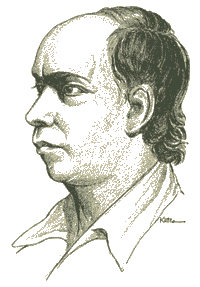 AFTER a course at Trinity College, Dublin, made miserable by his personal ungainliness and bad manners, Oliver Goldsmith was on the point of emigrating to America. If he had not missed his ship, high school students might not find in their course of prescribed reading such literary gems as The Deserted Village or The Vicar of Wakefield, nor play lovers enjoy the absurdities of his dramatic masterpiece, She Stoops to Conquer.
AFTER a course at Trinity College, Dublin, made miserable by his personal ungainliness and bad manners, Oliver Goldsmith was on the point of emigrating to America. If he had not missed his ship, high school students might not find in their course of prescribed reading such literary gems as The Deserted Village or The Vicar of Wakefield, nor play lovers enjoy the absurdities of his dramatic masterpiece, She Stoops to Conquer.
But if the keynote of Goldsmith's character was improvidence, there seems, during his youth at any rate, always to have been a helping hand to rescue him from the penalties of improvidence. After he missed the boat to America, he was given 50 pounds with which to devote himself to the study of law. His intentions were doubtless good, but the money he lost in gambling. Subsequently he was again "endowed," this time that he might study medicine. For a year and a half he made a half-hearted pretense at interest. Then Wanderlust seized him and he became a continental tramp earning a bare subsistence by means of his flute.
Coming to London in 1756 he became a literary hack, writing brilliantly, albeit superficially, on any subject that offered the promise of keeping him out of a debtor's cell. Carelessness, intemperance and gambling brought him into debt at a time when he should have been most prosperous. Thus it was that from a background of worry and ill health his famous comedy was written, inspired, it is said, by an incident of his own youth.
Just at the close of a school term he had been given a small sum of money. He determined to celebrate with a new experience, that of spending the night at an inn in the course of his homeward journey. He stopped off in a small town through which the stage passed, and by chance it was the local wit whom he asked for directions to the inn. This wag directed him to the house of a prosperous squire. The family fell in with the joke and the young Goldsmith with considerable swagger actually did spend the night in the house.
For a time it seemed doubtful whether this comedy would ever reach production, so absolutely contrary was it to all accepted tenets of the contemporary stage. When it was finally accepted and staged, however, it enjoyed an immediate and lasting success. In fact, this play sounded the keynote of Goldsmith's "mission" . . . to render more natural the comedy of his time and to strike a decisive blow at the "genteel" or "sentimental" comedy of his contemporaries.
Purchase Books about Oliver Goldsmith
Search eBay! for Oliver Goldsmith collectibles